Related Research Articles

The Protectorate, officially the Commonwealth of England, Scotland and Ireland, is the period from 16 December 1653 to 25 May 1659 during which England, Wales, Scotland, Ireland and associated territories were joined together in the Commonwealth of England, governed by a Lord Protector. It began when Barebone's Parliament was dismissed, and the Instrument of Government appointed Oliver Cromwell Lord Protector of the Commonwealth. Cromwell died in September 1658 and was succeeded by his son Richard Cromwell.

George Monck, 1st Duke of Albemarle KG PC JP was an English soldier, who fought on both sides during the Wars of the Three Kingdoms. A prominent military figure under the Commonwealth, his support was crucial to the Restoration of Charles II in 1660, who rewarded him with the title Duke of Albemarle and other senior positions.
John Desborough (1608–1680) was an English soldier and politician who supported the parliamentary cause during the English Civil War.

Sir Edward Rossiter was an English landowner, soldier and politician from Lincolnshire. He fought with the Parliamentarian army in the Wars of the Three Kingdoms and sat as an MP at various times between 1646 and 1660.
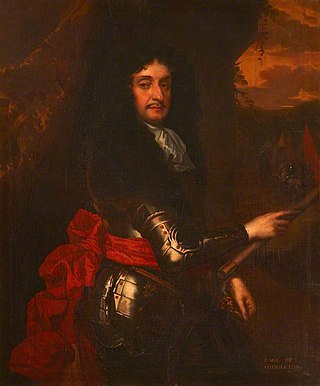
John Middleton, 1st Earl of Middleton was a professional soldier and mercenary from Kincardineshire in Scotland. Beginning his career in the Thirty Years War, during the Wars of the Three Kingdoms he fought for the Covenanters and Parliamentarians until 1648, when he switched sides to the Royalists.

Richard Vaughan, 2nd Earl of Carbery KB, PC, styled The Honourable from 1621 until 1628 and then Lord Vaughan until 1634, was a Welsh soldier, peer and politician.
Colonel Philip Jones was a Welsh military leader and politician who sat in the House of Commons between 1650 and 1656. He rose to the rank of Colonel in the service of the Parliamentary Army under Fairfax during the English Civil War. As Governor of Swansea he successfully held the town against the Royalist forces.
John Vaughan may refer to:
William Sydenham (1615–1661) was a Cromwellian soldier; and the eldest brother of Thomas Sydenham. He fought for Parliament and defeated the Royalists in various skirmishes in Dorset. He was member of the various parliaments of the Commonwealth, avowal conservative principles, and defended the liberties of Englishmen. In 1654 made councillor and commissioner of the treasury by Oliver Cromwell. Took the side of the army against Parliament. In 1660, after the Protectorate, and before the Restoration, he was expelled from the Long Parliament. After the Restoration, he was perpetually incapacitated from holding office by the Indemnity and Oblivion Act.
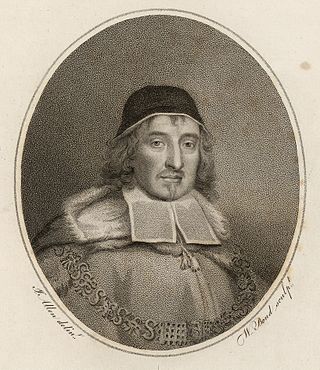
Sir John Vaughan SL, of Trawsgoed, was a justice in the Kingdom of England.
Sixteen forty-six was the fifth and final year of the First English Civil War. By the beginning of 1646 military victory for the Parliamentary forces was in sight. A Royalist army was defeated in the field at the Battle of Torrington on 16 February and the last Royalist field army was defeated at the Battle of Stow-on-the-Wold on 21 March. From then on the New Model Army cleared the remaining Royalist strongholds. The politics moved into a post-war phase with all the major factions in England and Scotland trying to reach an accommodation with King Charles I that would further their own particular interests.

John Arundell, Esquire, of Trerice in Cornwall, later given the epithet "Jack for the King", was a member of an ancient Cornish gentry family, who as a Royalist during the Civil War served King Charles I as Governor of Pendennis Castle, Falmouth. In 1646 he retained the castle in a heroic manner during a five-month-long siege by Fairfax, during which his forces were reduced by hunger to eating their horses, and finally achieved an honourable surrender
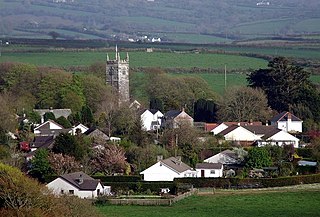
Anthony Nicholl was an English politician, friend and associate of Parliamentary leaders John Pym and John Hampden.

George Twisleton, 1618 to 12 May 1667, was a member of the landed gentry from Yorkshire and colonel in the Parliamentarian army during the Wars of the Three Kingdoms. Under the Commonwealth of England, he sat as MP for Anglesey from 1654 to 1659.
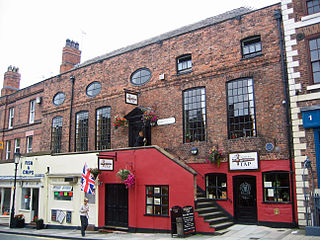
Sir Francis Gamull, 1st Baronet (1606–1654) was an English politician who sat in the House of Commons from 1640 to 1644. He supported the Royalist side in the English Civil War and was active in the defence of Chester.
This is a timeline for the English Civil War in Shropshire.
Glencairn's rising was a Royalist revolt in Scotland against the Protectorate of Oliver Cromwell from 1653 to 1654. It was led by William Cunningham, 9th Earl of Glencairn (1610–1664), who was given command of the Royalist forces in Scotland by Charles II. Initially successful it began to suffer divisions when John Middleton arrived to replace Glencairn as commander, resulting in a series of duels between officers. It was defeated when Thomas Morgan caught Middleton's army at Dalnaspidal on 19 July 1654. Although the rising was unsuccessful it forced a change of policy by the Cromwellian regime, which now looked for a reconciliation with former Royalists and Engagers.
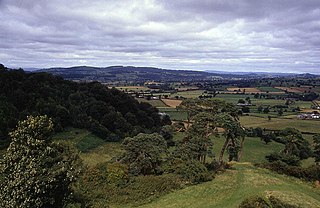
William Sandys, 6th Baron Sandys, was a Cavalier officer in the Royalist army during the English Civil War.

The Battle of Denbigh Green took place during the closing stages of the First English Civil War. Fought just outside the Royalist garrison of Denbigh, it has been described as probably the only action in the North Wales theatre of the war "meriting the description of battle".